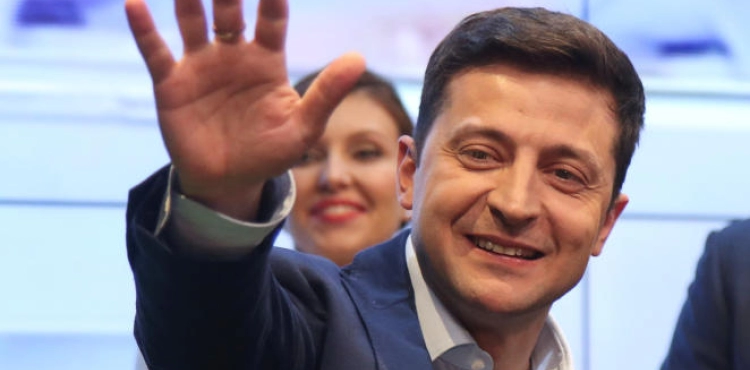Ukraine will start an unpreceded new chapter in its history on Monday, not knowing whether to launch a new breakthrough or a dangerous leap in the unknown after comic actor Volodymyr Zelinsky won the presidency in a country plagued by rampant corruption. A difficult economic situation and a bloody war.
Permanent doubts about his ability to take power and criticism of him for the vagueness of his program, the 41-year-old comedian won 73.1 percent of the vote, according to semi-final results released Monday, against 24.5 percent of outgoing President Petro Poroshenko .
Many voters now consider the sixth and youngest president of independent Ukraine to offer a fresh start on many issues of tension and resentment. He has overwhelming support and has received congratulations from world leaders, including in two phone calls from US Presidents Donald Trump and Frenchman Emmanuel Macron.
But without offering a specific program that goes beyond his intention to "break the system" without deviating from the pro-Western line adopted by the country in 2014, and without a parliamentary majority, the future looks difficult for the president, who will be formally installed by early June after playing a television series The role of a history professor is elected as president, a figure that reflects the image of simplicity and integrity in favor of the candidate.
"People have shown that they want renewal, they want a change," Karina, 28, said in the streets of Kiev on Monday morning, adding that she was "positively surprised" by Boroshenko´s reaction, which quickly acknowledged his defeat. "I thought fraud would happen, In the end, we had the most honest elections in the history of Ukraine. "
International observers acknowledge their report on Monday afternoon, after a first round of accolades as they met democratic standards, and Sunday was not denounced as a major fraud in a country often power transfers were difficult with two revolts in less than three decades of independence.
European Council President Donald Tusk and European Commission President Jean-Claude Juncker, in a joint letter to Zelinsky, hailed the "strong adherence to democracy and the rule of law demonstrated by the Ukrainian people during the electoral process."
German Chancellor Angela Merkel on Monday congratulated Zeilensky on his victory in the presidency, saying in a statement that "the federal government will continue to actively support Ukraine in its right to sovereignty and territorial integrity in the future."
In the midst of a wave of hostility to the elites sweeping the world, Zilinsky´s sweeping victory reflects the Ukrainians´ suspicion of a political class, with 53-year-old Poroshenko considered to be one of the most prominent faces.
Although the outgoing president was close to his country from the West, he did not succeed in improving the standard of living in the poorest country in Europe and failed to end the war with the pro-Russian separatists, which have killed some 13,000 people in five years. One of the main drawbacks is that he has shown no determination to combat rampant corruption.
The challenges facing the president-elect are enormous, in the amount of hopes he has brought to power.
On the domestic scene, he must prove his ability to gather a team around him and take initiatives without a parliamentary majority, and at the time raised his candidacy and even hostility of a large part of the political class pledged to address them. Legislative elections will not take place before 27 October, which foreshadows a new phase of political conflict.
"I love Zelinsky, he´s a young man, a good person, but I´m afraid he will not last long and spend it," said the 79-year-old retired spokeswoman in Kiev. "I do not know yet how much our political life is like a herd of wolves."
"It is good to change power, but for the challenges that remain the same with Ukraine: the aggression of Russia and the need to defend the country´s institutions," Alona said.
Following the creation of a pro-Western authority in Ukraine in 2014, Moscow annexed the Crimea and a war broke out in the east with separatists loyal to Russia, which killed some 13,000 people in five years.
After Moscow imposed three days before the second round of elections new sanctions banning oil and coal exports to Ukraine, Russian Prime Minister Dmitry Medvedev saw the election of the new president as an "opportunity to improve" bilateral relations, but stressed that he had no illusions.
Zelensky confirmed on Sunday evening his desire to "re-launch" the peace process with the participation of Russia on the war in the east of the country, reiterating his promise to reach out to residents of conflict areas.












